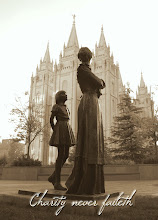
Louise Yates Robinson
“When Mother went to President [Heber J.]
Grant’s office to be set apart, she felt sure he had been misinformed about her
abilities,” said her daughter, “so she told him she’d be happy to do her best
in whatever he asked her to do, but she wanted him to know that she had limited
education, and very little money and social position, and she was afraid she
wouldn’t be the example that the women of the Relief Society would expect in a
leader. She finished by saying, ‘I’m just a humble woman!’ President Grant answered
‘Sister Louizy, 85% of the women of our Church are humble women. We are calling
you to be the leader of them.’”
Understanding the importance of helping
mothers stay at home, Sister Robison opened the Mormon Handicraft Shop in Salt Lake City , Utah Europe .
Relief Society choirs became known as the “Singing Mothers” after Louise’s
favorite quote, “A singing mother makes a happy home.”7 She
instigated the first monument to the Relief Society in Nauvoo , Illinois
As it turned out, Louise was exactly what the women of the
Church needed. With the onset of the Great Depression, she understood the needs
of the struggling sisters and had great empathy for them and wisdom to share
with them. “She spent much of her time focusing on sisters who lacked formal
education and material wealth, feeling she was in similar circumstances.” “Sister
Robison stressed the volunteer compassionate services,” according to Belle
Spafford, ninth general president of the Relief Society.
Served 1928-1939
“Go where you’re needed; do what you can.”
“If we only half do our work, we will have no pleasure, if we do
it from a sense of duty we will have no joy, but if we feel we are a branch of
this vine, and that our Father in Heaven has felt us to be worthy to be a
member of that branch, and that we can carry this work when it is here to do,
then we will have joy.”4
